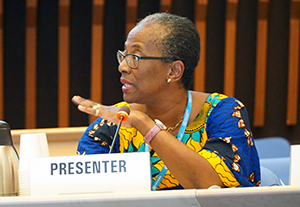The TDR-hosted ESSENCE on Health Research initiative to harmonize and increase the impact of funding for health research and research capacity recently marked its 10th anniversary by reflecting on top achievements, lessons learned and new objectives for the group.

ESSENCE members in Ottawa, Canada in April 2018
Among its key achievements, ESSENCE has produced five good practice documents for funding agencies and research councils in Africa and other disease-affected areas in the world. The publications focus on good practices for research management; how to plan, monitor and evaluate research capacity strengthening; and, how to improve the costing of research in low- and middle-income (LMIC) settings.
These practice recommendations have helped to set and share standards for funding research in LMICs – for donors at global, regional and local levels. This harmonization of funder approach has also reaped great benefits to the scientists of disease-endemic countries by, for example:
- Encouraging use of one monitoring and evaluation framework to bring consistency to impact measurement;
- Defining the differences between direct and indirect costs for research proposals;
- Simplifying funding applications; and,
- Making results dissemination part of activities so findings are shared with funders as well as the broader health and scientific communities.
 Professor Hannah Akuffo presents ESSENCE achievements to TDR’s Joint Coordinating Board in June 2018 | ESSENCE started at a meeting in Stockholm, Sweden, hosted by the Swedish International Development Cooperation Agency (Sida) in April 2008. At the time many in the development community recognized that uncoordinated and fragmented funding for health research and capacity was wasting resources and holding back effectiveness of funding to LMICs. “What started as an idea has turned into a movement. Donor and funder engagement grew from about 10 members to 28 members over the last decade, and now includes development agencies, foundations, research councils and other government agencies,” says Professor Hannah Akuffo, ESSENCE co-chair and a senior research specialist at Sida. |
Areas of work
Key areas of work have focused on:
- understanding the conditions and capacity for relevant research in low- and middle-income countries (LMICs);
- increasing dialogue among funders of health research and capacity, at every level, to align on how to solve commonly shared issues;
- piloting country approaches and testing joint funding schemes; and
- increasing participation by researchers and research institutions in LMICs to understand local perspectives, concerns and priorities for research and capacity strengthening.
“I can’t think of any other initiative that brings together such a diverse group of stakeholders. I am confident that building on those strengths we can make a difference on the ground,” says Linda Kupfer, co-chair of ESSENCE and a senior scientist of Fogarty International Center at the United States National Institutes of Health.
Next actions
Next efforts in the near term will focus on raising the profile of implementation science to improve health systems, and promoting research management, data sharing and more open access to research results.
For more information, contact Garry Aslanyan.

